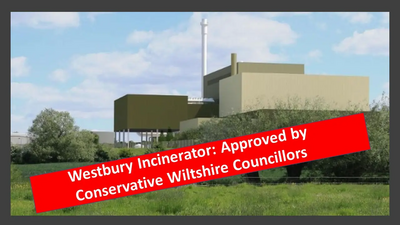Conservatives vote for Westbury Incinerator!

Wiltshire Council's Strategic Planning Committee met on Tuesday (June 22) to decide on the application from Northacre Renewable Energy Ltd to build what the committee report describes as a "moving grate combustion plant for the 'recovery' of energy from residual waste (Energy from Waste (EfW)). Moving grate combustion is a thermal process to break down waste into a fraction of its original size. The plant generates baseload renewable energy (i.e. steam, which can then be used for other purposes such as electricity generation and heating) and uses a flue gas treatment system to reduce the resultant flue gas emission concentrations to below (sic) environmental standards."
The recommendation from planning officers was for approval. They point out that Northacre already have permission for an 'Advanced Thermal Treatment' gasification plant on the site, which in outward appearance would be very similar to the new proposal. Ironically the ATT plant is more advanced in environmental terms than the incinerator now up for approval. However Northacre say that since Brexit the ATT is no longer economically viable, hence this application.
Next to the site is a Mechanical Biological Treatment plant which "produces from municipal household waste solid recovered fuel (SRF) which is presently exported by road to mainland Europe for use in established energy from waste (EfW) facilities there. The current planning application, if approved, would remove the need for export of all the SRF; some of the SRF (c. 52,000 tpa) would instead be used in the proposed EfW facility, moving from one facility to the other by conveyor."
The new incinerator would also mop up most of Wiltshire's commercial and industrial waste, as well as being able to take waste products from neighbouring authorities.
The decision was to grant planning permission with 22 conditions. The split was on party lines, with the seven Conservative members voting for, whilst the three Lib Dems and one Independent voted against.
There is a proviso that the Secretary of State needs to consider whether or not to 'call in' the application for his own determination before the permission can be issued. This will create a delay, but probably won't change the decision. Both the Lib Dem spokesperson for South West Wiltshire, Ellen Nicholson and local MP have written to the Secretary of State as are local residents.
Italicised text above is taken directly from the committee report. The full report is available here.
The planning application has received 1,972 representations, 1,966 of which are objections. All local councils, including Westbury, Heywood, Bratton, Edington, Dilton Marsh, North Bradley, Chapmanslade, Coulston, Steeple Ashton, West Ashton, Upton Scudamore, Warminster, Bradford on Avon, Trowbridge, Melksham, Corsham, Frome, and Marlborough, have objected, as have the South West Wiltshire Liberal Democrats alongside Wiltshire Liberal Democrats and local MP Andrew Murrison. Wiltshire Council's own 'Climate Change Team' have objected, though all other internal WC consultees, including public health and highways, have not. The business next door, ARLA also objected and raised the issue of potential shut downs making it economically unviable to remain in Westbury.
The objectors refer to the undesirability of incineration as a means of disposing of waste and the consequent requirement to make sure we keep producing lots of rubbish to feed the machine. There are concerns about the health impacts of pollution from the plant, the traffic generated, the noise and the smells. The incinerator is to be situated on the edge of a town that is already on the pollution watch with no viable bypass to
In order to operate, the plant will need a permit from the Environment Agency (EA). As well as the initial authorisation the EA should then monitor the continuing operation of the plant. This allows Wiltshire Council to offload a lot of responsibility. As planning officers repeatedly point out, that decision is for the EA to make and the EA will have to be convinced that the process is not causing a hazard to the local communities.
In their response the EA say: "We are only able to consider certain technical issues as part of the permit. Our consultation period is the public's opportunity to bring evidence to us, which they think we may not have seen or considered. The list below summaries (sic) which issues are covered by the permitting process and so are our responsibility to regulate,
emissions to air,
pollution to surface and ground water,
noise control,
dust control,
pest control,
fire risk,
odour control
Planning officers also pointed out the difficulty of using climate change arguments as a reason for refusal.
